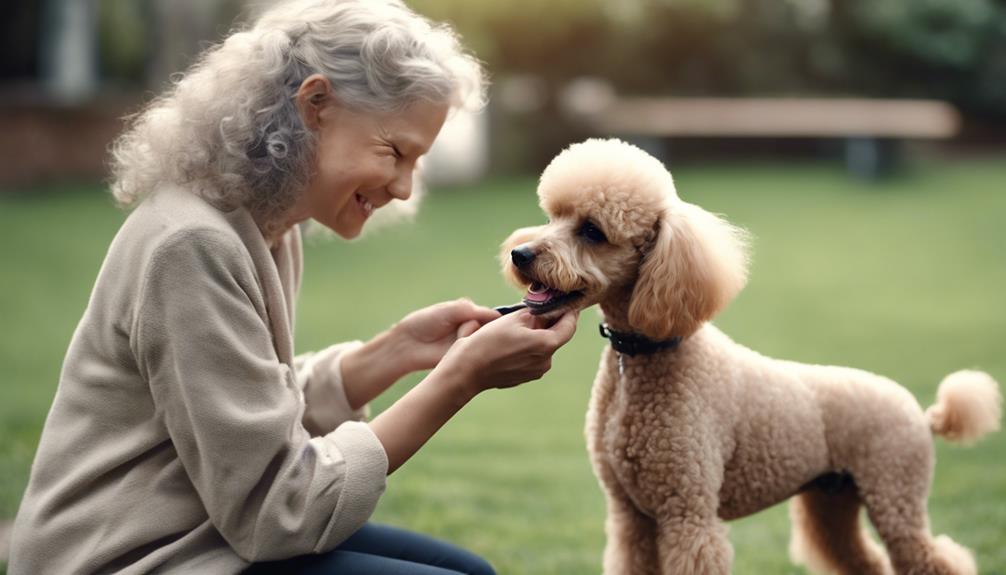As a responsible Poodle owner, navigating the different stages of your furry companion's life is akin to steering a ship through changing tides. The journey from puppyhood to the golden years requires tailored care that evolves with your Poodle's needs. Understanding how to adapt their diet, exercise, grooming, and healthcare practices is crucial for ensuring their well-being at every age. Let's explore the nuances of age-appropriate care for Poodles, offering insights that will help you provide the best support for your loyal four-legged friend.
Key Takeaways
- Start poodle care early with potty training and socialization for a well-rounded adult dog.
- Transition food gradually for balanced nutrition at different life stages.
- Prioritize preventative health measures like vaccinations and dental care for a healthy poodle.
- Tailor exercise, grooming, and joint care to support mobility and quality of life from puppy to senior years.
Puppy Care Basics
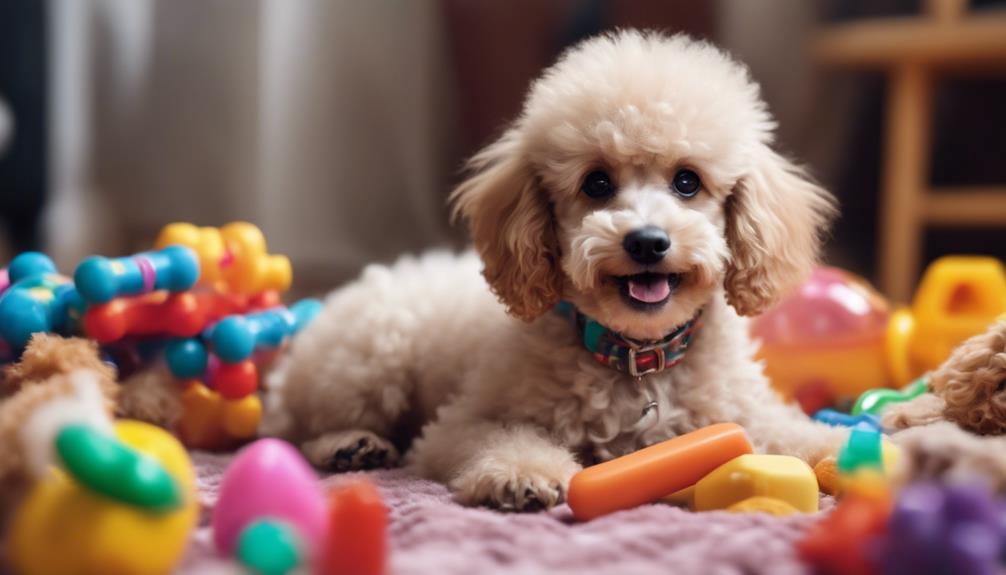
When caring for a poodle puppy, starting potty training at 8 weeks old is crucial to establish good habits early. Consistent training routines and positive reinforcement are key to helping your puppy learn where to go potty. Additionally, beginning reward-based training at this age can create a strong bond between you and your puppy while encouraging desired behaviors.
Socialization is another essential aspect of caring for your poodle puppy. Introducing your puppy to various environments, people, and other animals between 3 to 12 weeks old can help them build positive behaviors and confidence. This early socialization period sets the foundation for a well-adjusted and sociable adult poodle.
In terms of nutrition, transitioning your standard poodle puppy to adult food around 16-18 months of age is important for their proper growth and development. Ensuring your puppy receives a balanced diet that meets their nutritional needs is vital for their overall health and well-being. Starting good habits early in training, socialization, and nutrition will help set your poodle puppy up for a happy and healthy life.
Nutrition for Growing Poodles

For growing poodles, ensuring their nutrition meets specific requirements is essential for their overall health and development. Poodle puppies have higher calorie and protein needs to support their developing bodies. Providing them with puppy food formulated with essential nutrients tailored to their growing requirements is crucial. Large breed poodle puppies, in particular, benefit from specially formulated food to promote healthy bone development. As they grow, transitioning to adult food is necessary, ensuring they receive at least 18% of their daily calories from protein for optimal health. It's also important to consider their dental health; adult teeth start coming in around 4-6 months of age, requiring appropriate food for chewing. Below is a table summarizing key nutritional needs for growing poodles:
| Nutritional Needs | Poodle Puppy |
|---|---|
| Calories | Higher calorie intake |
| Protein | Increased protein for growth |
| Essential Nutrients | Tailored nutrients in puppy food |
| Bone Development | Specially formulated food for healthy bone growth |
| Dental Health | Consideration for adult teeth development |
Socialization and Training Tips
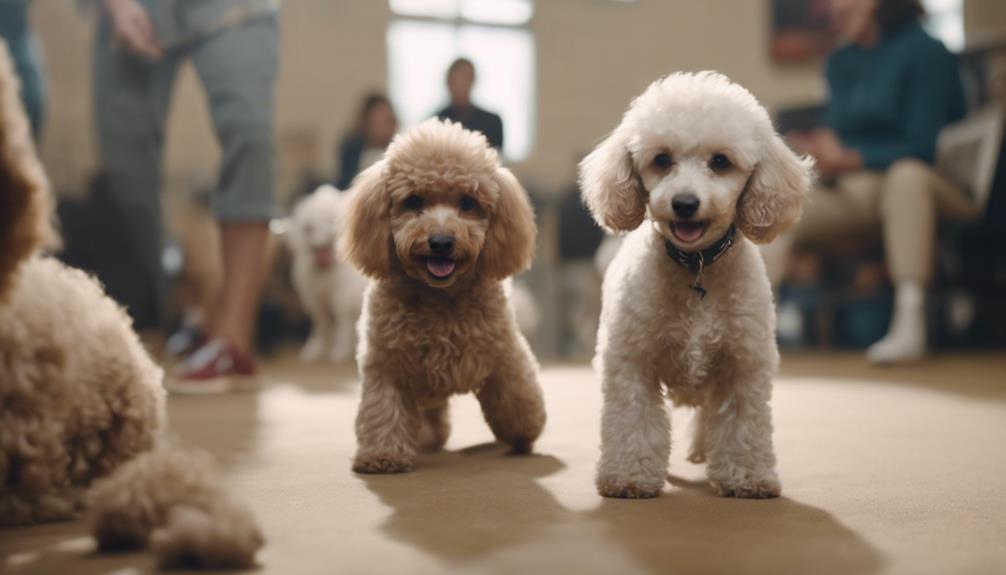
Ensuring proper socialization and training for your poodle from a young age is crucial for shaping their behavior and building a strong bond with you as their owner. The critical socialization period for poodles is between 3-12 weeks old, during which positive exposure to various people, animals, and environments is vital. Early training using positive reinforcement techniques not only helps in teaching basic commands like 'sit,' 'stay,' and 'come' but also establishes good behavior habits that last a lifetime. Consistent training routines play a significant role in preventing behavioral issues as your poodle grows older. By incorporating positive reinforcement methods into your training sessions, you can create a positive and rewarding learning environment for your poodle. Remember, patience and consistency are key when it comes to socializing and training your poodle, leading to a well-behaved and happy companion for years to come.
Preventative Health Measures for Puppies
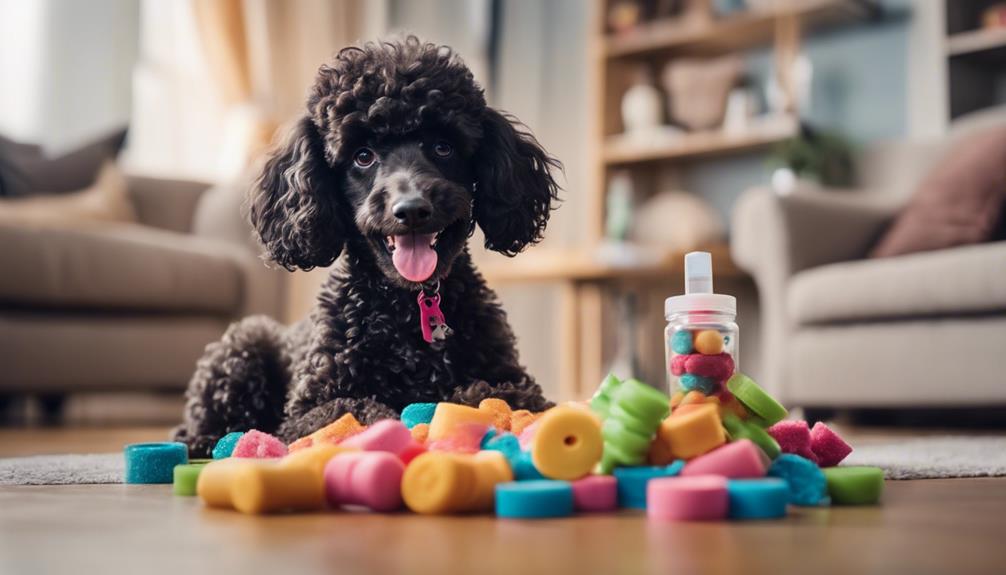
When caring for your poodle puppy, remember to stay on top of their vaccination schedule to protect them from dangerous diseases. Regular deworming is essential to prevent parasites that can harm your furry friend. Establishing a dental care routine early on will help maintain your puppy's oral health as they grow.
Puppy Vaccination Schedule
Start by ensuring your puppy receives a series of vaccinations starting at 6-8 weeks old to provide protection against common diseases like distemper, parvovirus, and hepatitis. Here's what you need to know about the puppy vaccination schedule:
- Initial Vaccinations: Begin at 6-8 weeks old with core vaccinations like distemper, adenovirus, parvovirus, and possibly rabies.
- Booster Shots: Follow up with boosters every 3-4 weeks until your puppy is around 16 weeks old for complete immunity.
- Non-Core Vaccines: Depending on your puppy's lifestyle and risk factors, additional vaccines such as for kennel cough or leptospirosis may be recommended.
Parasite Prevention Tips
To safeguard your puppy's health, begin implementing preventative measures against parasites early on. Puppies are highly susceptible to internal and external parasites, making it crucial to start parasite prevention from a young age. Administering regular flea and tick preventatives is essential to protect your puppy from common parasites. Particularly, heartworm prevention is paramount as heartworm disease can be life-threatening for puppies. Consult with your veterinarian to create a tailored parasite prevention plan that considers your puppy's lifestyle and specific risk factors. Routine testing and preventive medications are key components of parasite prevention to ensure your puppy's long-term health and well-being. Prioritize your puppy's health by staying proactive and seeking guidance from your veterinarian for the best parasite prevention strategies.
Dental Care Basics
For optimal preventative health care in puppies, initiating a routine dental care regimen early on is crucial. When it comes to dental care basics for your Poodle puppy, here are three essential tips to keep those puppy teeth healthy and strong:
- Start tooth brushing early: Begin brushing your puppy's teeth with a dog-specific toothbrush and toothpaste to prevent plaque buildup.
- Introduce dental chews and toys: Providing dental chews and toys can help keep your puppy's teeth clean and gums healthy.
- Regular vet check-ups: Schedule regular veterinary dental check-ups to monitor your puppy's dental health and address any issues promptly.
Transitioning to Adult Care
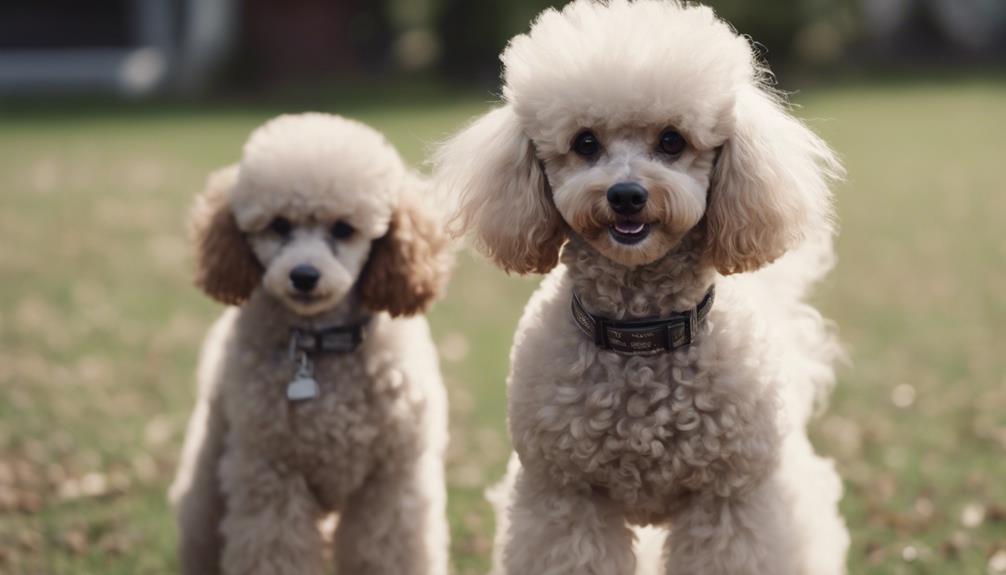
When transitioning your standard poodle to adult food, do so gradually over 5 days to avoid any digestive issues. Mixing puppy and adult food initially can provide essential nutrition during this change. If your poodle experiences any stomach problems, seek advice from your veterinarian to ensure a smooth transition.
Adult Diet Changes
Considering the changing nutritional needs of your poodle, it's essential to gradually transition them to adult food around 12-18 months to support their overall health and well-being. When transitioning your poodle to adult food, follow these steps:
- Gradual Transition: Mix adult food with puppy food over 5-7 days to prevent digestive issues.
- Balanced Nutrition: Adult dog food provides essential nutrients for your poodle's maintenance phase, focusing on overall health.
- Consultation: Seek guidance from a veterinarian for personalized advice on timing and the transition process tailored to your poodle's needs.
Health Monitoring Routines
As your poodle matures into adulthood, establishing a routine for monitoring their health becomes crucial. Keep a close eye on their weight, dental health, and behavior changes to catch any potential issues early on. Schedule regular vet check-ups at least once a year to ensure your adult Poodle stays healthy. It's essential to maintain updated vaccination records and discuss any necessary boosters with your vet to protect your furry friend. Adjust their diet and exercise routines as needed to support their changing nutritional and activity requirements. By staying proactive and attentive to your Poodle's health monitoring routines, you can help them lead a happy and healthy adult life.
Adult Poodle Health Guidelines
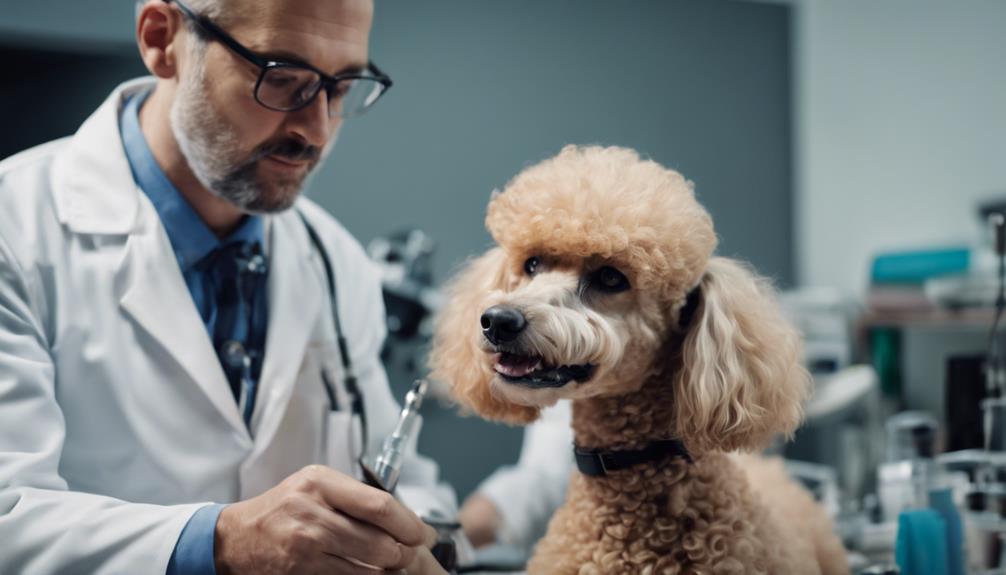
Maintaining optimal health for your adult Poodle requires a combination of regular dental cleanings, vaccinations, balanced diet, weight management, parasite prevention, and vigilant monitoring of any changes in behavior or physical condition. Here are some essential guidelines to ensure your adult Poodle stays healthy and happy:
- Regular Dental Cleanings: Schedule routine dental cleanings to prevent dental disease and maintain good oral health, which is crucial for your adult Poodle's overall well-being.
- Vaccinations: Keep up-to-date with your Poodle's vaccinations to protect them from common infections and diseases, ensuring they lead a healthy and active life.
- Balanced Diet and Weight Management: Provide a well-balanced diet tailored to your Poodle's specific needs and monitor their weight to prevent obesity-related health issues, promoting a long and healthy life for your furry companion.
Exercise and Mental Stimulation
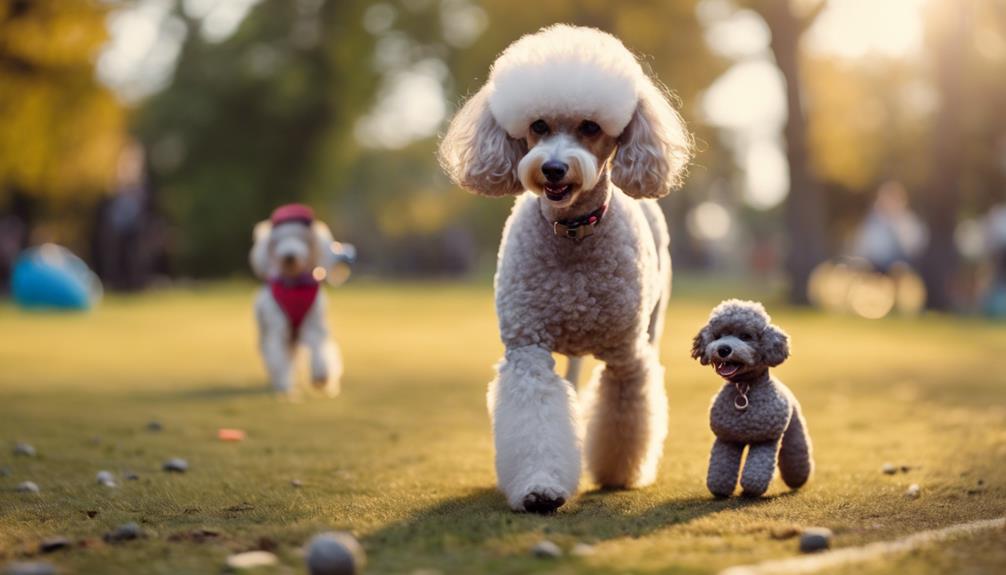
To ensure your Poodle's overall well-being, tailor their exercise routines and mental stimulation activities according to their age and energy level. Puppies thrive on short, frequent play sessions that provide mental stimulation and aid in socialization. As your Poodle transitions into adulthood, daily walks and engaging activities like agility training can help maintain their physical and mental health. It is crucial to adapt these activities as your Poodle enters their senior years, focusing on gentle exercises to preserve mobility and mental alertness.
Incorporating mental stimulation into your Poodle's routine is essential at every age. Puzzle toys, interactive games, and obedience training can keep their minds sharp and provide much-needed enrichment. By adjusting the intensity and type of exercise to suit your Poodle's current life stage, you are ensuring that they receive age-appropriate care that supports their overall well-being. Remember, a well-exercised and mentally stimulated Poodle is a happy and healthy companion.
Monitoring Senior Poodle Health
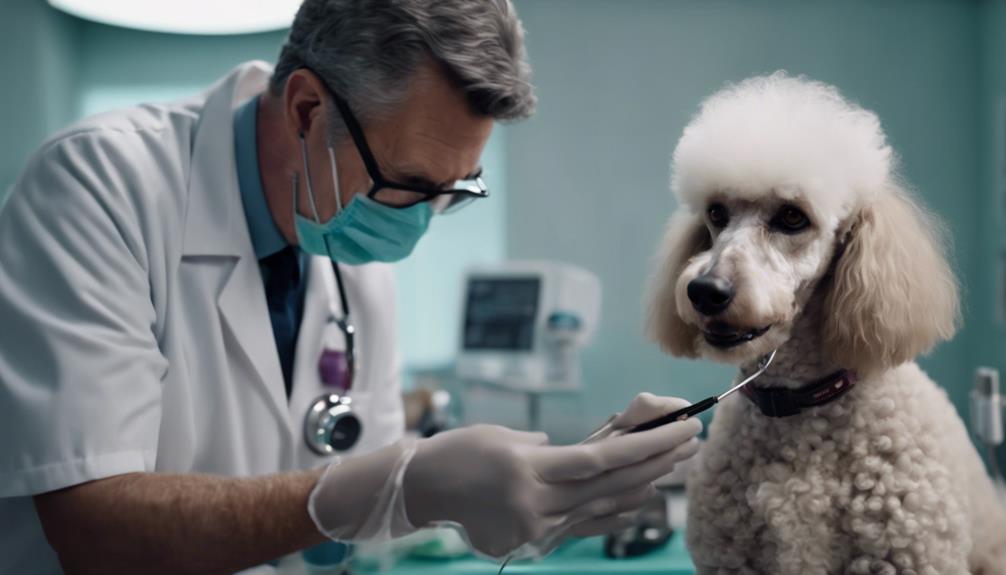
Regular geriatric screenings play a crucial role in monitoring your senior Poodle's health status. As your furry companion ages, it is essential to be vigilant for any physical or behavioral changes that may indicate underlying health issues. Here are some key steps to help you monitor your senior Poodle's health effectively:
- Regular Vet Check-ups: Schedule bi-annual geriatric screenings with your veterinarian to assess your senior Poodle's overall health and catch any potential problems early on.
- Observing Changes: Pay attention to physical changes like weight loss, mobility issues, or lumps, as well as behavioral changes such as increased anxiety, confusion, or disorientation.
- Communication with Vet: Keep your veterinarian informed about any changes in eating habits, activity levels, or sleep patterns. Discuss any concerns promptly to address them and ensure your senior Poodle's well-being.
Monitoring your senior Poodle's health diligently can help maintain their quality of life and address any age-related issues promptly.
Dietary Adjustments for Seniors

For senior Poodles, making dietary adjustments is crucial to support their health and well-being as they age. As senior dogs, they may require lower calorie diets to prevent obesity and maintain a healthy weight. Transitioning to senior-specific formulas can be beneficial, as these are enriched with nutrients like omega-6 fatty acids and glucosamine, which support joint health and overall vitality. Consulting with a veterinarian is essential to tailor a senior diet to your Poodle's individual needs.
Nutrient-dense foods are vital for senior Poodles, especially since they may have a decreased appetite. Choosing high-quality, easily digestible options can help meet their nutritional requirements. Adjusting portion sizes accordingly is key to addressing common digestive issues that arise in senior dogs. By being mindful of these dietary adjustments and providing the necessary nutrients, you can help your senior Poodle lead a healthy and comfortable life in their golden years.
Managing Common Senior Health Issues
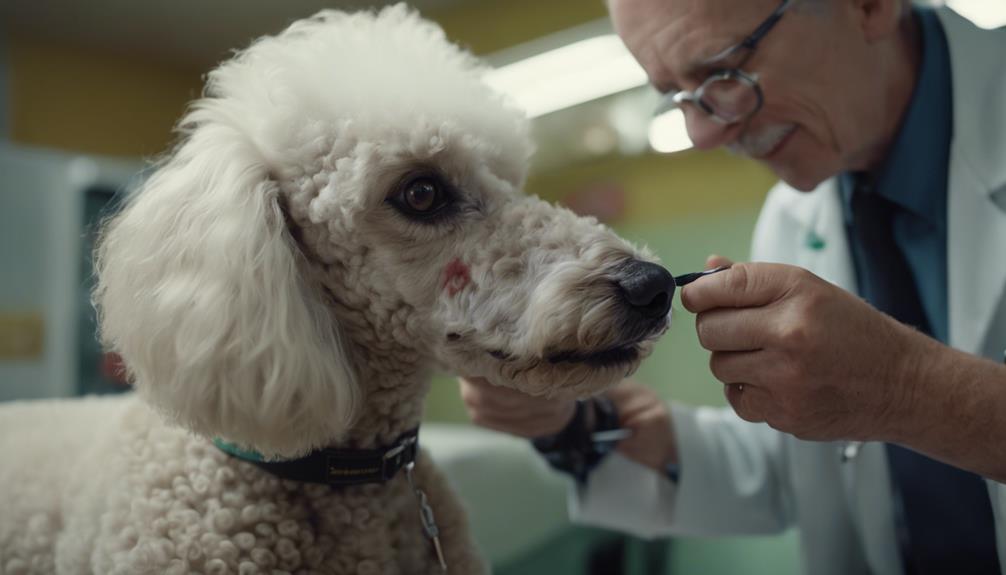
Making dietary adjustments for your senior Poodle is crucial, and now let's address how to manage common health issues that they may face as they age.
- Arthritis Management: Arthritis is prevalent in senior Poodles, causing mobility issues like difficulty standing and climbing stairs. Regular vet check-ups can help detect and manage this condition early, ensuring your Poodle's comfort and quality of life.
- Skin Sensitivity and Care: Senior Poodles often experience increased skin sensitivity, dryness, and the development of sores. Gentle grooming practices and proper skincare are essential to maintain their skin health and prevent discomfort.
- Behavioral Changes: Changes in behavior, such as increased sleeping, separation anxiety, or housebreaking accidents, can signal underlying health problems in senior Poodles. Monitoring these changes closely and seeking veterinary advice promptly can address issues before they escalate, ensuring your Poodle stays happy and healthy in their golden years.
Cognitive Support for Aging Poodles

To best support your aging Poodle's cognitive health, consider incorporating mental stimulation activities like interactive toys and puzzles. Engaging your senior Poodle in these activities can help keep their mind sharp and prevent cognitive decline. Providing a consistent routine and environment is also crucial for maintaining cognitive function in aging Poodles. Regular training sessions with positive reinforcement not only strengthen your bond but also support your Poodle's cognitive well-being.
Introducing new experiences and challenges can stimulate your senior Poodle's brain, promoting mental agility and overall cognitive health. Be attentive to any signs of cognitive decline, such as disorientation or confusion, as early detection is key to proactive care for aging Poodles. By prioritizing cognitive support through mental stimulation and a nurturing environment, you can help your beloved Poodle age gracefully with a sharp mind and a happy heart.
Joint Care and Mobility Support

Taking care of your poodle's joints is essential as they age. Consider providing supplements like glucosamine and chondroitin to support their joint health and reduce inflammation. Engaging in regular, gentle exercises can also help maintain their mobility and muscle strength.
Joint Health Tips
Ensuring proper joint care and mobility support is crucial for maintaining the overall health and well-being of your aging Poodle. Here are some essential tips to help keep your Poodle's joints healthy and strong:
- Joint Supplements: Consider providing vet-approved joint supplements to support your Poodle's mobility and comfort.
- Regular Exercise: Engage your Poodle in low-impact activities like swimming or gentle walks to help maintain joint health.
- Weight Management: Keep your Poodle at a healthy weight through proper diet and exercise to reduce strain on their joints.
Mobility Aid Options
Maintaining your aging Poodle's joint health and mobility can be further supported through various mobility aid options designed to enhance their comfort and accessibility. Consider incorporating joint care supplements like glucosamine and chondroitin into their diet to support joint health. Providing an orthopedic bed can help alleviate pressure on their joints while resting. Pet ramps or stairs can assist them in reaching higher surfaces with ease and minimal strain on their joints. Engaging in low-impact exercises such as swimming or gentle walks can help maintain muscle tone and joint flexibility. Consulting with a veterinarian for tailored mobility support options ensures the best care for your Poodle's joint health.
| Mobility Aid Options | Description | Benefits |
|---|---|---|
| Joint Care Supplements | Include glucosamine and chondroitin in their diet | Support joint health and mobility |
| Orthopedic Bed | Provides comfort and alleviates pressure on joints | Enhances rest and reduces joint strain |
| Pet Ramps | Helps in accessing higher surfaces easily | Prevents joint strain while reaching elevated areas |
| Low-Impact Exercises | Swimming or gentle walks maintain muscle tone | Improves joint flexibility and overall mobility |
Dental Health Through the Years
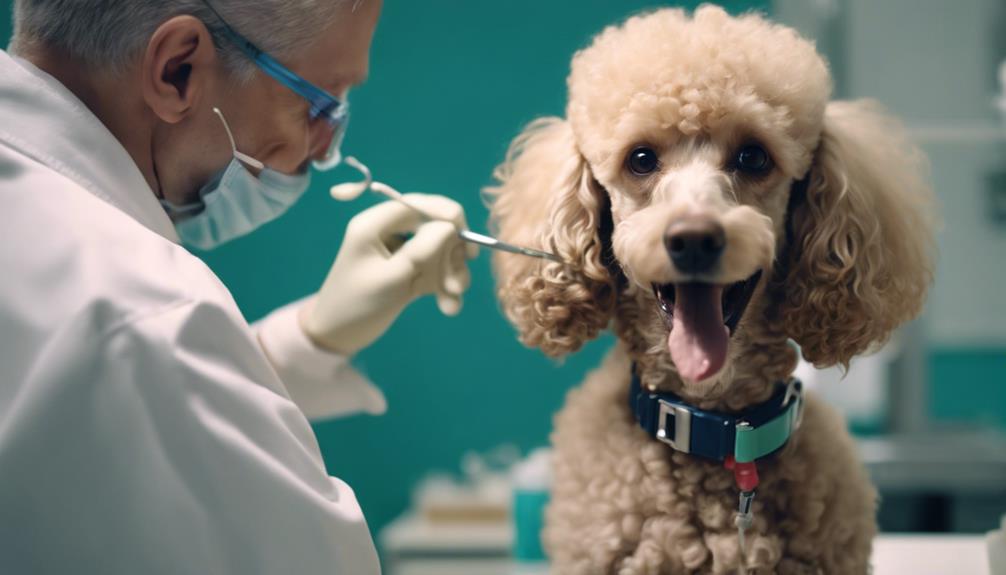
Proper dental care plays a crucial role in ensuring the long-term health and well-being of your Poodle across all stages of life. Neglecting your Poodle's dental health can lead to serious consequences, including tooth loss, tartar build-up, and potential infections that may affect vital organs. Here are three essential tips to maintain your Poodle's dental health:
- Regular Dental Cleanings: Schedule routine dental cleanings with your veterinarian to prevent tooth loss and maintain overall health. These cleanings can help address tartar build-up and detect any potential issues early on.
- Home Care: Implement a regular dental care routine at home by brushing your Poodle's teeth. This simple practice can significantly reduce the risk of dental disease and promote good oral hygiene.
- Early Intervention: Be proactive in addressing any signs of dental problems such as bad breath, swollen gums, or reluctance to eat. Early intervention can prevent further complications and ensure your Poodle's comfort and well-being throughout their life.
Grooming Needs at Different Stages
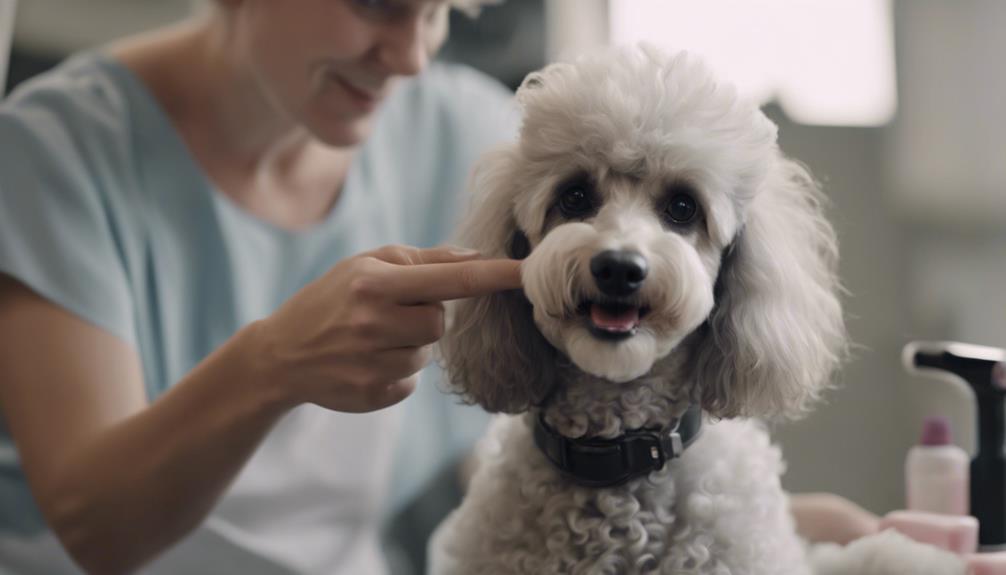
To keep your Poodle looking and feeling their best at every stage of life, understanding their grooming needs at different ages is essential. Poodle puppies require regular grooming to acclimate them to the process early on. This helps them become comfortable with grooming as they grow. Adult Poodles need consistent grooming to maintain their curly coats and prevent matting. Using the right tools and clips for their specific coat type is crucial. For senior Poodles, who may experience skin sensitivity, gentle grooming techniques and products are necessary to avoid irritation. Additionally, regular grooming aids in preventing skin dryness and sores in senior Poodles, promoting overall skin health. By adapting your grooming routine to meet the evolving needs of your Poodle as they transition from a puppy to an adult and eventually a senior, you can ensure they remain comfortable and healthy throughout their life.
Quality of Life Considerations

Considering the unique needs of your Poodle at different life stages greatly impacts their quality of life. To ensure your furry companion thrives, here are some key factors to consider:
- Regular Exercise: Providing your Poodle with age-appropriate exercise routines helps maintain physical health, weight management, and mental well-being.
- Mental Stimulation: Engaging your Poodle in mental exercises such as puzzle toys, training sessions, and interactive playtime can prevent boredom and promote cognitive function.
- Socialization and Preventive Care: Regular socialization with other dogs and humans can prevent behavioral issues and ensure your Poodle feels secure and happy. Additionally, staying up-to-date with preventive care measures like vaccinations and regular check-ups can help detect and address health issues early on, contributing to a longer and healthier life for your beloved pet.
Frequently Asked Questions
At What Age Is a Poodle Considered a Senior?
When is a poodle considered a senior? It varies based on size and health. As your poodle ages, watch for signs like slowing down and behavior changes. Regular check-ups and tailored care are key.
At What Age Is a Standard Poodle No Longer a Puppy?
As your Poodle matures, typically around 12-18 months, they transition from puppy to adult. This period marks changes in diet, training milestones, and health routines. Stay attentive to their nutritional needs, socialization, and regular check-ups.
What Age Do Poodles Slow Down?
As your Poodle ages, around 7-10 years old, they may start to slow down. Adjust their exercise routine, monitor their health closely, consider joint supplements, and provide mental stimulation to support their changing needs and keep them happy and healthy.
How Do You Take Care of a Senior Poodle?
When caring for a senior poodle, adjust grooming for sensitive skin, provide tailored exercise, offer a balanced diet, and monitor health closely. Like tending a delicate garden, nurture your aging companion with patience and understanding.
Conclusion
In conclusion, providing age-appropriate care for your Poodle is essential for their overall well-being. Did you know that 80% of dogs over the age of 8 show signs of arthritis? By adjusting their exercise routines, monitoring their health closely, and adapting to their changing needs, you can ensure a happy and healthy life for your furry friend. Remember, your Poodle relies on you to provide the best care possible at every stage of their life.
